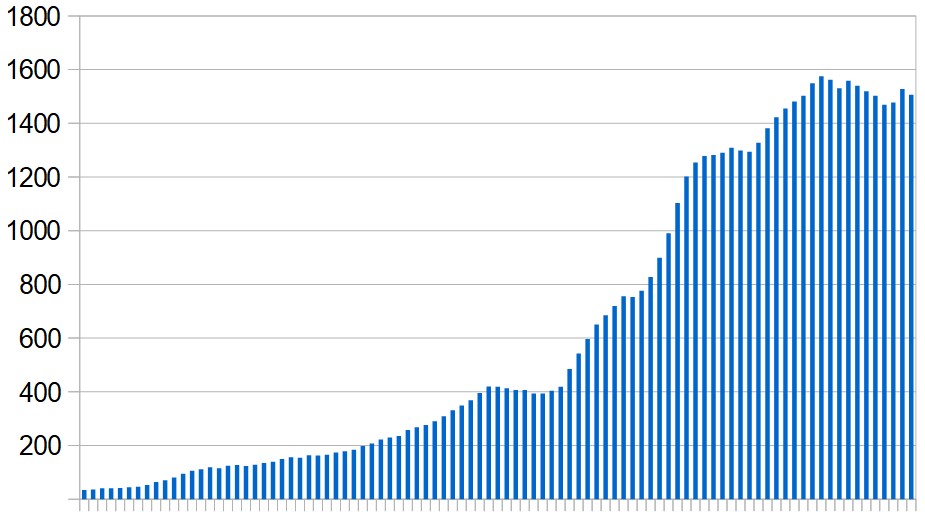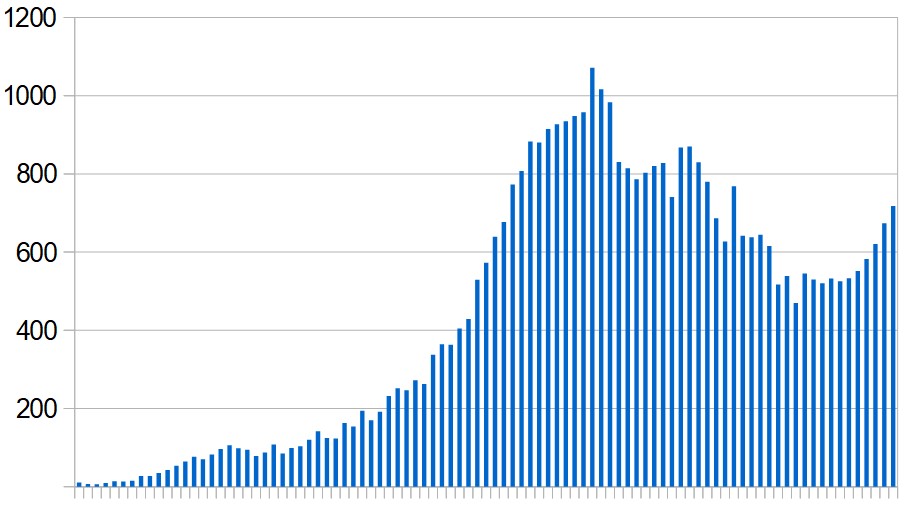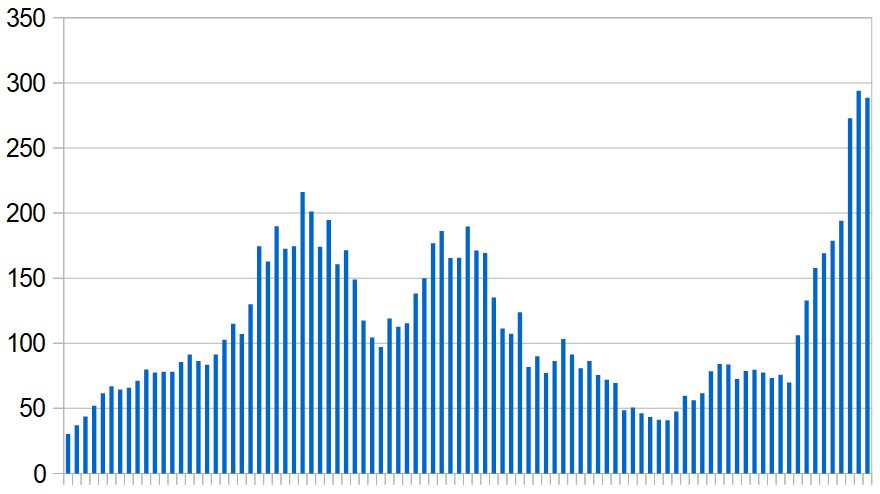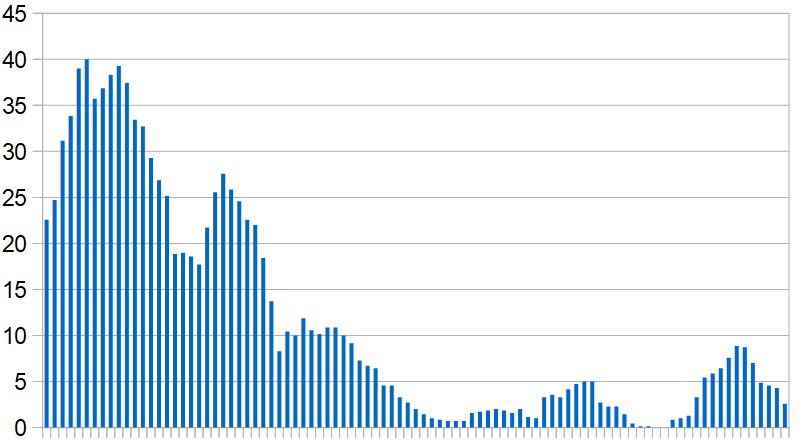Situation report: week ending 27 June 2020
REGIONAL OVERVIEW
The initial wave of Covid-19 infections has passed its peak in most countries of the Middle East and North Africa. Many have now embarked on a step-by-step process of easing lockdowns and other restrictions, and in some of them – most notably Israel – the result has been an increase in new cases.
Governments in the region frequently complain that efforts to control the virus are hampered by non-compliance from the public, either by failing to observe precautions – holding social gatherings, not wearing face masks, etc – or by flouting the rules for quarantine and self-isolation.
Overall, it has not been a good week. In 15 of the 20 countries monitored, newly-recorded cases have been running at a higher level than in the previous week. Three countries which had been making good progress – Israel, Palestine and Morocco – suffered serious setbacks. On a more positive note, Qatar and Saudi Arabia both reported a significant decrease in new cases.
The countries least equipped to cope with the epidemic are Yemen, Sudan, Iraq and Libya.
Detailed statistics for the region, based on official figures, can be found in this spreadsheet.
Last week's situation report is here.
ALGERIA
Algeria has recorded a relatively low number of cases – 289 per million inhabitants – but testing capacity is also low. New infections have increased during the past week but are still below the levels of a month ago. Algeria's death rate is higher than in most Arab countries.
For more details see: Covid-19 in Algeria
Confirmed cases: 12,685
New cases in past week: 1,181
Active cases: 2,734
Deaths: 825
Tests carried out: (unknown)
BAHRAIN
The level of new infections in Bahrain fluctuates but the general trend seems to be gradually upwards. Over the past month new cases have averaged 488 a day but the average for the past week has been 556. Migrant workers who often live in overcrowded conditions account for the majority of cases in Bahrain.
For more details see: Covid-19 in Bahrain
Confirmed cases: 24,805
New cases in past week: 3,889
Active cases: 5,595
Deaths: 57
Tests carried out: 521,000
EGYPT
 |
Egypt's strategy is to minimise economic damage by "coexisting" with the virus until a vaccine comes along. The authorities appear to have succeeded in slowing the epidemic's growth.
Over the last two weeks, according to official figures, the seven-day average of new cases has hovered within a fairly narrow band (1,455 to 1,575 a day), suggesting that a plateau may have been reached. However, health services are under strain, with medical staff complaining of inadequate protection, and the Covid-19 death rate is the highest among the Arab countries. Egypt hopes to start receiving foreign tourists again when its airports reopen on July 1.
For more details see: Covid-19 in Egypt
Confirmed cases: 62,755
New cases in past week: 10,544
Active cases: 43,398
Deaths: 2,017
Tests carried out: 135,000
IRAN
Iran was the first country in the region to be seriously affected by the virus and has since been hit by a second wave. Government figures show an initial wave of infections which peaked at the end of March. It subsided during April, briefly dipping below 1,000 new cases per day but the numbers have since risen again.
The level of new cases has been relatively stable over the past week – around 2,500 a day – which suggests the second wave is now coming to an end. There's a good deal of scepticism about Iran's official statistics, and it's widely assumed that they understate the scale of the problem.
Confirmed cases: 217,724
New cases in past week: 17,462
Active cases: 29,633
Deaths: 9,392
Tests carried out: 1.6 million
IRAQ
Iraq has seen steep rises since early June and new cases have climbed to record levels during the past week. The current seven-day average is 1,977 cases a day. Iraq's official figures are widely believed to understate the scale of the epidemic. Many cases go unreported because of social stigma, compliance with preventive measures appears to be low and health services are inadequate.
For more details see: Covid-19 in Iraq
Confirmed cases: 41,193
New cases in past week: 13,841
Active cases: 20,775
Deaths: 1,559
Tests carried out: 501,000
ISRAEL
Israel was relatively successful in controlling the initial wave of its epidemic but less successful in emerging from its lockdown. New infections peaked at around 600 a day in early April and by the second half of May had dropped to 15-16 a day. Most restrictions were lifted around the same time but as a result of that new cases have grown steadily throughout June.
This time last week the seven-day average for new cases was around 220 a day and is now more than 350. Although that is causing alarm, new infections are still well below the level reached during the peak of the initial wave in April and the rise is more gradual. The health minister said on Tuesday that Israel will not return to a total lockdown but to what he called a "breathing lockdown" which involves identifying viral hotspots and declaring them "restricted zones" (see report).
For more details see: Covid-19 in Israel
Confirmed cases: 22,800
New cases in past week: 2,461
Active cases: 5,614
Deaths: 314
Tests carried out: 920,000
JORDAN
Jordan has been one of the most successful Arab countries in controlling the virus, though that is not immediately apparent from the statistics. Of the 96 new cases recorded during the past week only eight were infected inside Jordan. The other 88 had all been quarantined on arriving in the country. Sixty-two of those were citizens returning from abroad and 26 were truck drivers coming from Saudi Arabia.
For more details see: Covid-19 in Jordan
Confirmed cases: 1,104
New cases in past week: 96
Active cases: 265
Deaths: 9
Tests carried out: 362,000
KUWAIT
 |
Kuwait appears to be over the worst. New infections peaked around May 25 and then dropped back substantially, though they have been increasing again during the past week. Migrant workers who often live in overcrowded conditions account for the majority of cases and many have now returned to their country of origin.
An article published this week by the Arab Gulf States Institute (a Washington-based think tank) takes a rare look at public discourse on coronavirus in Kuwait. It discusses this in the context of a populist trend in politics and hostility towards migrant workers.
For more details see: Covid-19 in Kuwait
Confirmed cases: 43,703
New cases in past week: 5,025
Active cases: 9,393
Deaths: 341
Tests carried out: 372,000
LEBANON
In the midst of a political and economic crisis Lebanon is fortunate in having a relatively small number of recorded cases so far. Many of the recent infections have been detected among people returning from abroad. A survey by the World Food Programme, which included Palestinian and Syrian refugees as well as Lebanese citizens, found that "due to a combination of containment measures for Covid-19 and a worsening economic crisis" two out of every three households have seen their income fall. Almost one-third have lost their job because of employers reducing staff or closing their business and Syrians in Lebanon have been disproportionately affected.
For more details see: Covid-19 in Lebanon
Confirmed cases: 1,697
New cases in past week: 187
Active cases: 520
Deaths: 33
Tests carried out: 125,000
LIBYA
Libya is in its ninth year of internal conflict. The UN-backed Government of National Unity in Tripoli is challenged by Field Marshall Haftar's forces based in the east of the country. There are also numerous militias. This leaves the country ill-equipped to cope with a major epidemic. Growing levels of insecurity, political fragmentation and weak governance have led to a deterioration of basic services, particularly in the health system. At least 27 health facilities have been damaged or closed by fighting and some have been attacked directly. The number of confirmed infections is still small but testing is very limited. There are 870,000 people – refugees, asylum seekers and displaced persons – who the UN regards as especially vulnerable.
For more details see: Covid-19 in Libya
Confirmed cases: 713
New cases in past week: 193
Active cases: 553
Deaths: 18
Tests carried out: 23,000
MOROCCO
 |
Until last weekend Morocco seemed to be making good progress. A strict lockdown had kept the number of known Covid-19 cases below 10,000 and by early June new infections had fallen to around 40 a day. However, there has now been a major setback with the discovery of hundreds of new cases in the Kenitra area, most notably among women from rural villages employed to pack strawberries (see report). Nevertheless, Morocco is pressing ahead with easing restrictions in most other parts of the country.
Meanwhile, the authorities say the contact-tracking app known as Wiqayatna ("Our Safeguard") has been downloaded more than two million times since it was launched on June 1 and have declared it "an undeniable success". That's still only a fraction of the 37 million population but there are hopes it will prove useful as the country emerges from its lockdown and social contacts increase.
For more details see: Covid-19 in Morocco
Confirmed cases: 11,633
New cases in past week: 2,020
Active cases: 2,759
Deaths: 218
Tests carried out: 620,000
OMAN
Oman's outbreak grew slowly until the end of May but new cases have risen substantially since then. The health ministry says this has "nothing to do with" the reopening of activities. A ministry official blamed "continued indifference" by the public, saying that "most of the infections among citizens could have been easily avoided".
As in the other Gulf states, migrant workers in Oman have been disproportionately affected by the virus and according to figures released this week almost 40,000 have left the country since March.
For more details see: Covid-19 in Oman
Confirmed cases: 36,034
New cases in past week: 8,364
Active cases: 16,399
Deaths: 153
Tests carried out: 177,000
PALESTINE
A week ago Palestine's outbreak was still small, with fewer than 1,000 known cases. Since then, though, almost 800 new infections have been recorded in the West Bank (see report). Many of these are attributed to people ignoring the rules for social distancing, which the authorities have difficulty enforcing. The health ministry says more than 30% of cases are the result of Palestinians travelling to and from work Israel where new cases are also increasing.
Fears of a major epidemic in Gaza have not materialised. Most of the known cases there are apparently due to contacts with Egypt.
For more details see: Covid-19 in Palestine
Confirmed cases: 1,795 (West Bank 1,485, Gaza 72, East Jerusalem 238)
New cases in past week: 841
Active cases: 1,170
Deaths: 5
Tests carried out: 85,000
QATAR
In population terms Qatar has more known cases than any other country – 30,000 per million inhabitants. Migrant workers have been disproportionately affected. Qatar's epidemic reached a peak in the first week of June and new cases have fallen steadily since then. The government has now embarked on a four-stage plan for lifting restrictions.
For more details see: Covid-19 in Qatar
Confirmed cases: 92,784
New cases in past week: 7,322
Active cases: 16,603
Deaths: 109
Tests carried out: 342,000
SAUDI ARABIA
Saudi Arabia has the largest number of recorded cases among the Arab countries. New infections reached an initial peak in the fourth week of May, then dropped back slightly before rising to new heights. However, new cases have fallen slightly every day for the last six days – which suggests a turning point may have been reached.
Migrant workers have been disproportionately affected but the authorities have also complained about non-compliance with precautionary measures by Saudi citizens.
It has been announced that this year's Hajj (the annual pilgrimage to Mecca) which is due to start on July 28 and normally attracts millions of Muslims from around the world will be restricted to people living in the kingdom – and may also be limited to around 1,000 participants who will be quarantined both before and after the event.
For more details see: Covid-19 in Saudi Arabia
Confirmed cases: 174,577
New cases in past week: 24,285
Active cases: 52,632
Deaths: 1,474
Tests carried out: 1.5 million
SUDAN
The coronavirus struck Sudan in the midst of a political transition following a popular uprising against the regime of President Bashir and the country is ill-equipped to cope with a major epidemic. Testing is very limited and official figures don't reflect the full scale of the outbreak. Most cases are said to be in and around the capital, Khartoum, but there's also concern about the Darfur area where large numbers of deaths are being reported, apparently caused by Covid-19.
The OCHA reports further deterioration in Sudan’s health care system which was already "under extreme stress" before the arrival of Covid-19. It says 81% of the population have no access to a functional health centre within two hours' walk from their home. Some existing facilities have been closed due to virus outbreaks or lack of medical staff.
For more details see: Covid-19 in Sudan
Confirmed cases: 9,257
New cases in past week: 941
Active cases: 4,671
Deaths: 572
Tests carried out: 401
SYRIA
Based on official figures (which some view with scepticism), Syria has very few confirmed cases. This may be because the Assad regime took preventive action before any infections had been officially recorded.
Recently, though, there has been a spate of new cases. Fifty-seven have been reported during the past week, raising Syria's cumulative total by 29%. The government's news agency gives few details but some of them may be linked to cases reported earlier in Ras al-Ma'ara, a town near Damascus, and Jdeidet al-Fadel in Quneitra province.
On Tuesday the health ministry announced that 12 cases had been detected among 123 students "who came from Lebanon to apply for their exams".
Fears have been raised about north-western and north-eastern parts of the country which are outside the regime's control. Millions of displaced people are living in those areas and health services are often rudimentary. So far, only a handful of cases have been diagnosed in the north-east and none in the north-west.
For more details see: Covid-19 in Syria
Confirmed cases: 255
New cases in past week: 57
Active cases: 145
Deaths: 8
Tests carried out: (unknown)
TUNISIA
 |
This morning Tunisia reopened its land, sea and air borders after a closure of more than three months. It is seeking to revive the economically important tourism industry and has begun promoting the country as a "safe" holiday destination.
There is currently little or no transmission of the virus inside Tunisia. The seven-day average of new cases has been in single figures every day since May 4.
For more details see: Covid-19 in Tunisia
Confirmed cases: 1,164
New cases in past week: 18
Active cases: 91
Deaths: 50
Tests carried out: 69,000
UNITED ARAB EMIRATES
The UAE's epidemic peaked in the last week of May when new cases were running at more than 900 a day. Numbers have fallen steadily since then and the current average is around 400 a day. Migrant workers have been disproportionately affected.
For more details see: Covid-19 in the UAE
Confirmed cases: 46,973
New cases in past week: 2,828
Active cases: 11,194
Deaths: 310
Tests carried out: 3.1 million
YEMEN
Because of the ongoing war, Yemen already faced a humanitarian crisis before the coronavirus arrived. Millions are malnourished and vulnerable to disease, and health services are inadequate. Official figures do not reflect the severity of the epidemic. Unusually large numbers of deaths are reported, many of them from symptoms resembling Covid-19 and hospitals often refuse treatment if coronavirus is suspected. The Houthis, who control the capital, Sanaa, and much of the north, have a policy of not reporting cases so as to avoid lowering morale and distracting from their war effort.
For more details see: Covid-19 in Yemen
Confirmed cases: 1,093
New cases in past week: 170
Active cases: 394
Deaths: 294
Tests carried out: 120

 RSS Feed
RSS Feed
